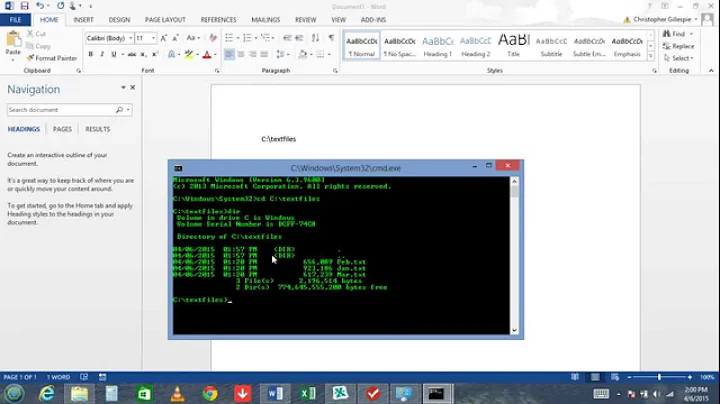combine multiple text files, _+ filenames_, into a single text file
Solution 1
I am sure there is something more clever, but here is a powershell script will combine all files:
$files = (dir *.txt)
$outfile = "out.txt"
$files | %{
$_.FullName | Add-Content $outfile
Get-Content $_.FullName | Add-Content $outfile
}
Is it efficient? Not terribly... but it will work in a pinch.
Solution 2
Inspired by the structure of Mitch's script, I've written a version for Unix-based environments, such as GNU/Linux and OS X:
find -regex '.*\.\(docx?\|org\|rtf\|te?xt\)$' | while read file
do
echo "* $file" >> target-file.org
cat "$file" | pandoc -t org >> target-file.org
done
(If you don't want to install pandoc, simply remove the pipe and command, | pandoc -t org.)
This script will find all files in the current directory and its subdirectories which have file extensions as described (.docx, etc).
For example, if the list includes fileA.text and fileB.rtf in subdirectory subd/, targetfile.org will receive lines such as:
* ./subd/fileA.text
<fileA's contents converted to an org file by pandoc>
* ./subd/fileB.rtf
<fileB's contents converted to an org file by pandoc>
I think this will leave target-file.org in a pretty good state for improving from within Emacs, without the script being too complicated. (Especially if you include the pandoc step.)
Related videos on Youtube
Brady Trainor
Updated on September 18, 2022Comments
-
Brady Trainor over 1 year
I would like to combine a handful of text files, but with titles (EDIT: filenames). Ideally, something like
* a filename contents of file ... * another filename contents of file ... etc...I am in windows (not DOS), but have access to powershell, pandoc, emacs, cygwin, or anything else you recommend. (Clearly I'm a newb trying out org-mode.)
I can easily put them all in one folder. But I would like to avoid typing the name of each file. If a bat file is recommended, I have never used one, but am willing to learn.
-
Rajib over 10 yearsPossible duplicate of this.
-
Brady Trainor over 10 years@Rajib, I did not understand that that question wanted the titles interspersed with the combined text.
-
Rajib over 10 yearsAh now i see you mean filename. Sorry I misunderstood "Title of file".
-
Brady Trainor over 10 yearsah, I will edit to adhere to nomenclature, but leave the term in question for search terms.
-
-
Brady Trainor over 10 yearsThat works tremendously. I simply navigated to the folder, right clicked the frame to paste your script, and hit <RET>. I can do a find replace to switch
C:\txt` to**`. -
Brady Trainor over 10 yearsTo clarify my comment for posterity, I navigated from within PowerShell.
-
Mitch over 10 years@BradyTrainor, if you only want the filename, but not the path, switch the line which is
$_.FullName | Add-Content $outfileto read$_.Name | Add-Content $outfile. -
Brady Trainor over 10 yearsThank you Mitch. So that I might continue to stave off learning the code, how might I add a string such as
" ** "? -
Mitch over 10 yearsYou can arbitrarily format things using the
-foperator. See blogs.technet.com/b/heyscriptingguy/archive/2013/03/12/… for details. To make the filename line be** filename, you would specify("** {0}" -f $_.Name) | Add-Content $outfile




